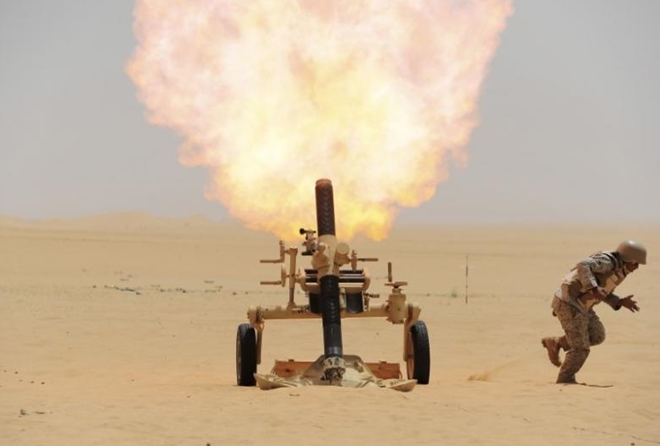U.S. to halt some arms sales to Saudi, citing civilian deaths in Yemen campaign
- US, Britain call for immediate ceasefire in Yemen
- 1,000s of Yemenis rally outside local UN office after deadly airstrike blamed on Saudi-led coalition
- Airstrikes on Yemen funeral kill at least 140 people, UN official says
The United States will also revamp future training of the kingdom's air force to focus on improving Saudi targeting practices, a persistent source of concern for Washington.
The decision reflects deep frustration within President Barack Obama's government over Saudi Arabia's practices in Yemen's 20-month-old war, which has killed more than 10,000 people and sparked humanitarian crises, including chronic food shortages, in the poorest country in the Middle East.
 |
| A Saudi soldier fires a mortar towards Houthi movement position, at the Saudi border with Yemen April 21, 2015. REUTERS/Stringer |
It could also further strain ties between Washington and Riyadh in the remaining days of Obama's administration and put the question of Saudi-U.S. relations squarely before the incoming administration of President-elect Donald Trump, who takes office on Jan. 20.
Still, the decision was not the cut-off in support that Saudi Arabia's biggest critics had hoped for and much of the U.S. military relationship will remain intact.
For example, the United States will keep refueling Saudi-led coalition aircraft involved in the campaign, and it is not cutting off all arms sales to the kingdom. And, in a nod to Saudi Arabia's security concerns, Washington will share more intelligence on the Saudi border with Yemen.
The kingdom has been subject to cross-border attacks by the Iran-allied Houthi movement. A Saudi-led military coalition intervened in Yemen's civil war in March 2015 and has launched thousands of air strikes against the Houthis.
Rights groups say Saudi-led coalition attacks on clinics, schools, markets and factories may amount to war crimes. Saudi Arabia has either denied the attacks or cited the presence of fighters in the targeted areas and has said it has tried to reduce civilian casualties.
"I think it’s a signal but too weak of a signal," said William Hartung of the U.S.-based Center for International Policy, responding to the U.S. decision. "As long as they’re going to refueling aircraft which is central to the bombing campaign, it’s hard to see that they’re using all the leverage they have," said Hartung, who authored a report earlier this year on U.S. arms offers to Saudi Arabia during Obama's tenure.
An Obama administration official, who spoke on condition of anonymity, said "systemic, endemic" problems in Saudi Arabia's targeting drove the U.S. decision to halt a future weapons sale involving precision-guided munitions.
"We've decided not to move forward with some foreign military sales cases for air-dropped munitions, PGMs (precision-guided munitions)," the official said.
"That's obviously a direct reflection of the concerns that we have about Saudi strikes that have resulted in civilian casualties," the official said. A second official confirmed the decision to suspend the sale of certain weaponry.
The officials declined to offer details. But a specific case put on hold appeared to involve the sale of hundreds of millions of dollars worth of guidance systems manufactured by Raytheon Co that convert dumb bombs into precision-guided munitions that can more accurately hit their targets.
A Raytheon spokesman referred questions to the Pentagon and State Department. Pentagon spokesman Captain Jeff Davis told a news briefing he was unaware of the Reuters report.
There was no immediate comment from Saudi officials.

